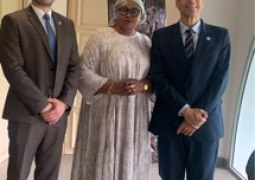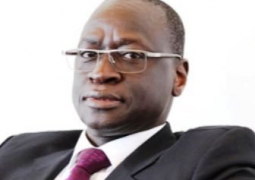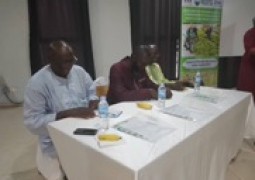The three-year grant is aimed at strengthening good governance and accountability, social cohesion, and a transformed economy for the wellbeing of all Gambians. The project will benefit 3000 people, strengthen 10 CBOs and 11 communities. It also seeks to increase the participation of Civil Society Organizations (CSOs) in tackling climate change and promoting environmental sustainability.
The focus of the project has been placed on labour-intensive work interconnected with women's empowerment and youth participation.
Corrade Pampaloni, EU ambassador to The Gambia in his statement acknowledged that the economic empowerment of women is crucial for the sustainable development of the country and its economic growth.
“Economies that reach parity in their labour markets, not only increase GDPs, but also reduce income inequality within society. The project will promote the participation of women and youth in the green economy, in eco-restoration, and as agents of environmental protection. It will also support exchanges of information and expertise to promote mutual learning and networks to increase understanding of climate change, environmental sustainability, and the green economy," he highlighted.
Ambassador Pampaloni observed that CSOs are assets and key actors for the development of any country, recalling that they played a critical role in filling the gaps where the government was unable to provide adequate services.
Lamin Dibba, Minister of Environment, Climate Change, and Natural Resources, said that The Gambia like most developing countries is contributing minimally to the cause of climate change.
“However, the vagaries of climate change negatively impact our economy. The erratic nature of rainfall, coupled with increased temperatures have resulted in a decline in crop yield and increased livestock mortality."
Omar Badjie, executive director of AAITG, explained the burden that climate change has on agriculture and those with informal jobs especially those who depend on agriculture.
"Given the context of our country, over 70% of the population depends on agriculture and agricultural-related activities for their livelihoods. A country which is going through a transitional process from dictatorship to democracy, the relevance and pertinence of resilience against climate change and good governance cannot be overemphasized."
The country manager of Action Against Hunger, Ablavi Madeleine Djossou, indicated that the project aims to contribute to promoting the well-being of Gambians by further transitioning to a green economy supported by good and responsible governance and inclusive management.
The project operates in three districts of the North Bank Region namely Lower Baddibu, Central Baddibu and Upper Baddibu.





